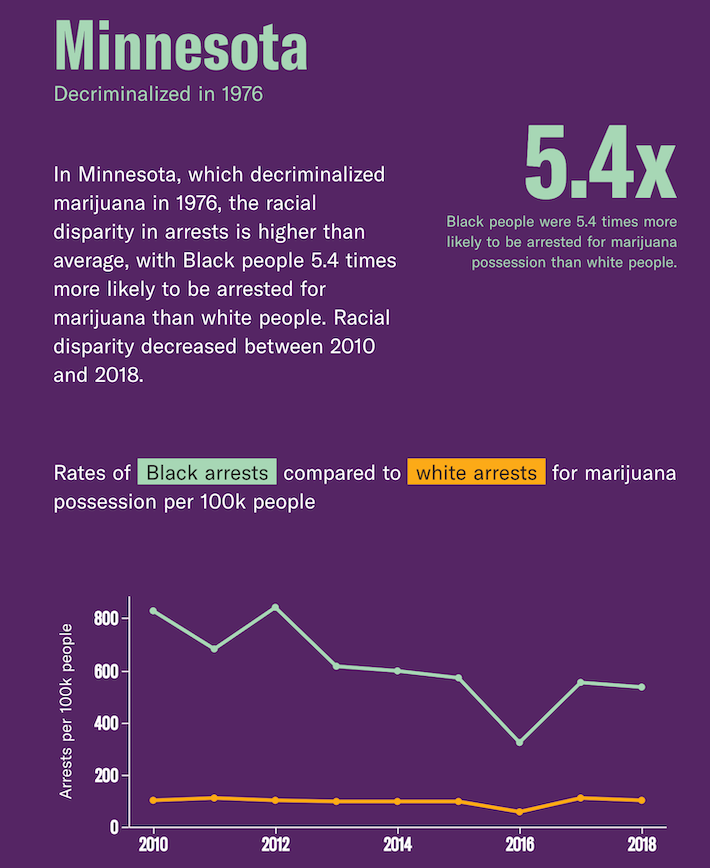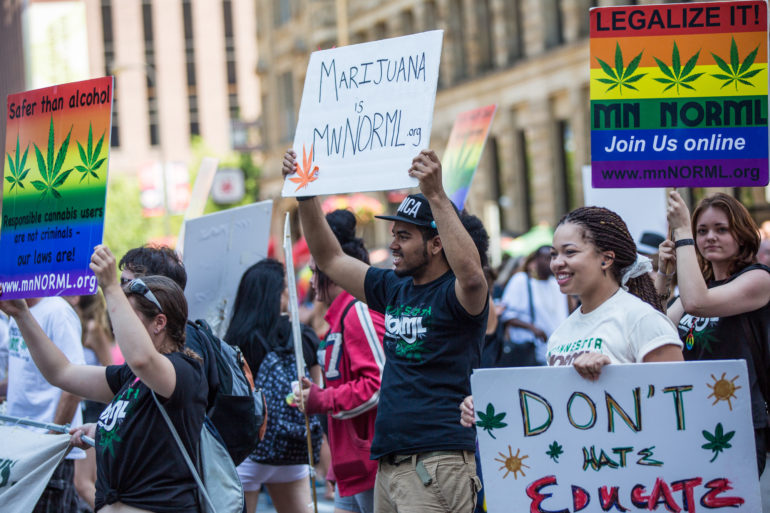Summary:
- Good news for all you Minnesotans — a bill seeking to legalize recreational cannabis is set to be heard in a House committee today
- The bill looks to permit Minnesotan adults 21 and over 1.5 ounces of cannabis on their person and grow up to eight plants
- Social equity will be prioritized, preventing large corporations from monopolizing the cannabis market. Cannabis records will also be expunged.
- Priority business licensing will be given to veterans who have been dishonored due to cannabis charges, as well as businesses based in low-income areas
- Tax revenue from cannabis sales will be allocated to fund public economic services and promote community cohesion
- Legalization will also help to tackle racial inequality that exists in Minnesota’s current cannabis laws
- Medical cannabis is legal in Minnesota, though it’s heavily restricted — recreational legalization should see a dramatic increase in new and existing users
- It is predicted that the bill will face a significant hurdle should it reach Minnesota’s Republican-controlled Senate — many unsure of how it’ll be received
A cannabis legalization bill HF 600 for Minnesota will be heard in a House committee on February 17, 2021, two weeks after it was formally introduced.
The bill, which was proposed by House Majority Leader, Ryan Winkler (D), would make it legal for adults aged 21 and over to buy and possess 1.5 ounces of cannabis, as well as grow up to eight plants.
It would also seek to promote social equity by preventing large corporations from dominating the cannabis market. Instead, future cannabis businesses situated in low-income areas and those owned by veterans dishonored due to cannabis-related charges will be prioritized for licenses.
Cannabis conviction expungements and black market prevention
Legalization would also expunge historical cannabis convictions from Minnesotans charged with possession, as well as potentially putting a stop to black market cannabis trade.
A responsibly regulated market is better than an illegal market. Minnesota’s current cannabis laws are doing more harm than good.
“A responsibly regulated market is better than an illegal market,” Winkler said in a statement on the subject of Minnesota’s current cannabis laws. He added that they are currently “doing more harm than good”.
House Representative, Zack Stephenson (D), stated how he has “seen first hand the amount of resources the state spends on current cannabis restrictions” and that “we ought to be strategic in where these resources are going so we can be efficient in how we address more pressing public safety needs”.
Should the bill pass, cannabis sales in the state would be taxed at 10%. Part of the revenue generated by this tax will be used to fund programs that aid economic development and community cohesion.
Combating Minnesota racial inequality
Legalization will also be instrumental in tackling the racial inequality that currently exists in Minnesota’s current cannabis convictions. The issue was raised by the House Select Committee on Racial Justice in December 2020 and lawmakers were urged to legalize cannabis as a way of addressing systemic racism in the state.

“Black Minnesotans are over five times more likely to be arrested for marijuana than those who are white,” said House Representative Rena Moran (D). “This is one of the worst disparities in the nation, and true even though both groups use it at similar rates.”
Increased accessibility
Although Minnesota legalized medical cannabis in 2014, its recreational use is heavily restricted. Legalizing cannabis for recreational use will allow those who are unable to obtain a medical prescription to buy what they need legally.
Currently, roughly 8% of Minnesotans use cannabis, nearly 2% less than the national average and over 20% less than states with legalized recreational cannabis use.
If recreational cannabis is finally legalized in Minnesota, we’ll see quite a dramatic but natural rise in cannabis use. However, medical marijuana use tends to see a decline.
Significant hurdles ahead?
Should the bill pass in the House, it is likely to face a significant hurdle when it reaches the Republican-controlled Senate, where Majority Leader Paul Gazelka (R) made his feelings on the matter clear.
“We are focused on the Minnesota Priorities that balance the budget without raising taxes,” he said in a statement. “I would not consider legalizing recreational marijuana as a Minnesota priority.”
However, Republican state South Dakota stunned the country in November 2020 with its passing of medical and recreational cannabis ballots. The results of which turned its previously total prohibition laws on its head, which offers some hope that Minnesota could follow suit.
“These votes are a stunning rebuke to those elected officials that for decades have refused to move forward with substantive marijuana law reform,” said Erik Altieri, Executive Director of NORML, on South Dakota’s ballot results. “They are yet another indication of the near-universal popularity of these policy changes among voters in all regions of the United States.”
Should the Senate block the legalization bill, Winkler hopes they will allow a public ballot on the matter in 2022.
